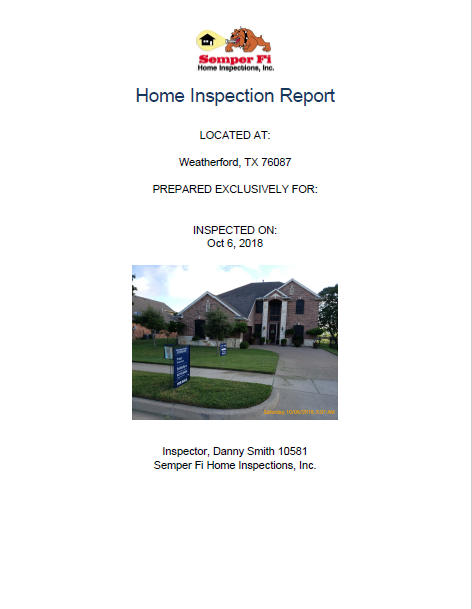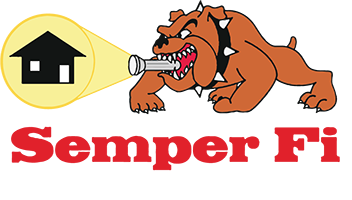The first few pages of your home inspection report introduce the property address, information about the inspection according to the state’s standards of practice, home inspector information, and a comment key or definitions.

The home inspector will provide information to help understand what each different element of the report means. They’ll give a key of symbols or codes which they’ll use throughout the report to identify the severity of each issue.
The majority of your home inspection report covers every inch of the property. This is where you’ll find the most detailed information about each issue, why it’s an issue, and the inspector’s recommended course of action.
Semper Fi Home Inspections expands your home inspection report by including video clips when appropriate, and returning your report to you on the same day.
You can expect your home inspector to include information about:
- Structural components like the foundation and framing of the home
- Exterior features like siding, porches, balconies, walkways, and driveways
- Roof features like shingles, flashing, and skylights
- Plumbing systems like pipes, drains, and water heating equipment
- Electrical equipment like service panels, breakers, and fuses
- Heating and cooling systems
Items not included in the inspection report will be the condition of the inside of walls, and other items – such as lawn sprinklers or pools – may require an additional inspection and would not be included on a standard home inspection report.
Though inspectors won’t give you estimated repair costs, they’ll typically make a recommendation such as “this item should be addressed by a carpenter” or “this system should be evaluated by a plumber.” You would research the costs or find a reputable contractor after receiving your report, and could ask your real estate agent for recommendations.
Because of this, it’s extremely important to have an inspection done as soon as you can and not wait until the very end of your inspection period. The inspection period time frame can range between one and 30 days and must be agreed upon by both the seller and buyer at the beginning of a real estate transaction. You don’t want to receive your report after your inspection contingency has expired because you may not be able to negotiate repairs.
Here are five items that you’ll want to pay attention to if problems are found.
- Foundation
- Roof
- HVAC systems
- Electrical systems
- Plumbing systems
In the last pages of the report, you’ll find a summary of the identified issues accompanied by a symbol or rating. It makes it easier to refer back to a reported issue without having to dig through dozens of pages.
The summary is important to refer to during negotiations. Safety concerns and defects give the buyer more negotiation leverage, whereas general repairs are a lower priority.
For a professional home or commercial inspection in the Dallas/Fort Worth Metroplex that will provide you peace of mind, schedule your inspection now
Call
682-351-2267
or book online


